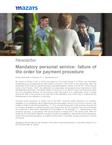
Mandatory personal service: failure of the order for payment procedure
By means of Ruling C-031 of 2019 (see page 9 of the communiqué 2 of 2019), the Colombian Constitutional Court reaffirmed its obiter dictum of Ruling C-726 of 2014 in the sense that, within the framework of the order for payment process regulated between articles 419 and 421 of the General Code of the Process -CGP-, the notification by notice does not proceed, being imperative to notify the defendant personally. This determination of the Court, in our opinion, does not necessarily follow from the procedure foreseen for the process under discussion; it is undesirable, since it implies leaving the fate of the process to the sole will of the defendant; and, in this way, it undermines the effectiveness of this institution in Colombia.
Pursuant to the provisions of Article 419 of the CGP, "whoever seeks payment of a monetary obligation, of a contractual nature, determined and enforceable, which is of a minimum amount, may initiate an order for payment proceeding (...)". Thus, through the payment order process, the payment of monetary obligations could be pursued, even though they are not "express, clear [or] enforceable [or] contained in documents originating from the debtor or his principal (...)", requirements of the executive process, in accordance with the provisions of Article 422 of the same Code. With the foregoing, the Colombian legislator sought to provide an expeditious, special declaratory procedure, close to the executive procedure, to creditors without title in Colombia, usually coming from informal commerce.
Regarding the procedure to be followed in the order for payment process in Colombia, Article 421 of the CGP provides as follows:
"The order containing the payment order does not admit appeals and shall be notified personally to the debtor (...)". Giving scope to the transcribed provisions, in judgment C-726 of 2014 the Constitutional Court determined that:
"In addition to the foregoing, in this type of special process, the requirement made by the judge has a dual nature. On the one hand, it constitutes the notification and at the same time, the payment requirement, which must be notified personally, without the possibility of notification by notice. The paragraph of article 421 of the General Code of the Process expressly prohibits the summons of the defendant, which entails the guarantee that the debtor has to act in the process and not allow the constitution of a title of execution without his knowledge".
We do not share the conclusion of the Court, because in the analyzed case the notification by notice does not proceed, for the following reasons:
1. Article 421 cited above indicates that the order requiring payment shall be notified personally, without regulating the manner in which such notification shall be made. Consequently, it is necessary to resort to the provisions of article 290 of the same code regarding personal notification. In the event that the latter is not feasible, the article in question provides for the possibility of continuing with notification by notice:
"6. When the summoned person does not appear within the indicated opportunity, the interested party shall proceed with the notification by notice".
2. The sole paragraph of Article 421 lists the improper institutions in the order for payment proceeding, without including notification by notice:
"Paragraph. In this proceeding, the intervention of third parties, preliminary objections, counterclaims, the summons of the defendant and the appointment of a guardian ad litem shall not be admitted. The precautionary measures provided for other declaratory proceedings may be taken. Once the judgment has been rendered in favor of the creditor, the precautionary measures proper to executive proceedings shall be taken".
As long as it is not included in said list, it must be concluded that the notification by notice is excluded and, therefore, allowed in the order for payment proceeding.
3. To accept exclusively the personal notification of the payment order is to subordinate the fate of the process to the will of the defendant, since it is sufficient that the defendant does not appear in order to be personally notified of said order for the process to not be able to continue, and the judge must terminate it.
According to what has been said, the position of the Constitutional Court implies condemning the order for payment proceeding to absolute failure in Colombia, since it would be the only judicial proceeding in our legal system in which the simple inaction of the defendant, through his omission of notification, would successfully enervate the plaintiff's claim.
Unfortunately, in Decision C-031 of 2019, the Constitutional Court consciously reiterates its error and considers that "this circumstance does not constitute a barrier to access to justice, nor a disproportionate burden for the creditor, since the same [CGP] offers other procedural means for the judicial enforceability of the monetary obligation, which do admit diverse and supplementary forms of notification to the defendant".
Thus, despite the legislator's good intentions, creditors without an enforceable title in Colombia find themselves in a situation very close to the one they were in under the Code of Civil Procedure: given the practical unfeasibility of the payment order process whose fate is left exclusively to the will of the defendant debtor, they must seek to establish their title through conciliation or the practice of advance evidence.


